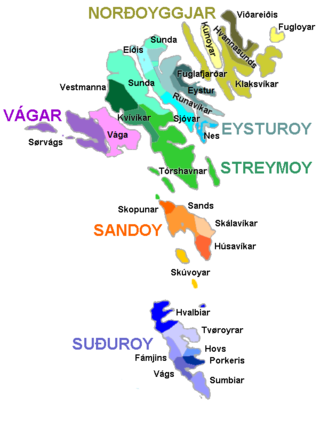Related Research Articles

The economy of the Faroe Islands was the 166th largest in the world in 2014, having a nominal gross domestic product (GDP) of $2.613 billion per annum. GDP increased from DKK 8 billion in 1999, to 21 billion in 2019. The vast majority of Faroese exports, around 90%, consists of fishery products.
This is a timeline of Faroese history comprising important legal and territorial changes and political events in Iceland and its predecessor states. To read about the background to these events, see history of the Faroe Islands.

Klaksvík is the second largest town of the Faroe Islands behind Tórshavn. The town is located on Borðoy, which is one of the northernmost islands. It is the administrative centre of Klaksvík municipality.

The króna is the currency of the Faroe Islands. It is issued by Danmarks Nationalbank, the central bank of Denmark. It is not a separate currency, but is rather a local issue of banknotes denominated in the Danish krone, although Danish-issued coins are still used. Consequently, it does not have an ISO 4217 currency code and instead shares that of the Danish krone, DKK. This means that in the Faroe Islands, credit cards are charged in Danish kroner. The króna is subdivided into 100 oyru(r).
Kommunusamskipan Føroya is the organization of the greater municipalities of the Faroe Islands. The members are Tórshavn, Klaksvík, Runavík, Tvøroyri, Fuglafjørður, Vágur and Sandur.
The Faroese mass media consists of several newspapers, radio stations, magazines, as well as a local TV station, Kringvarp Føroya.

Klaksvíkar Ítróttarfelag, commonly abbreviated to KÍ and also known as KÍ Klaksvík, is a Faroese professional football club based in Klaksvík. The club was founded in 1904 and is one of the most successful Faroese football clubs, having won the Faroe Islands Premier League twenty-one times and the Faroe Islands Cup six times. The club wears blue and white and plays matches at the Við Djúpumýrar stadium.

The Faroe or Faeroe Islands, or simply the Faroes, are an archipelago in the North Atlantic Ocean and an autonomous territory of the Kingdom of Denmark. The official language of the country is Faroese, which is closely related to and partially mutually intelligible with Icelandic.

Föroya Bjór is a Faroese brewing company based in Klaksvík. Apart from beers the company also produces soft drinks. It was established in 1888 in Klaksvík.

The Faroe Islands are administratively divided in 29 municipalities (kommunur), with about 120 cities and villages. Until December 31, 2008, there were 34 municipalities, and until December 31, 2004, there were 48 municipalities. In the coming years the number of Faroese municipalities is expected to drop to somewhere between 7 and 15, as there is currently a rationale towards municipal amalgamation and a decentralization of public services. In 1998 it was suggested that no municipality should have fewer than 2,000 inhabitants, but whether this will be true is a political question. The Faroese government has furthermore decided not to conduct forced, top-down amalgamation, but to leave the process to the free will of the municipalities. In many small municipalities there is some resistance to the amalgamation process, and as a result two kinds of municipalities are being created: large municipalities (town-municipalities) that are eager to attract smaller municipalities into amalgamation, and small municipalities which are either trying to avoid amalgamation or seek to amalgamate with other small municipalities. The geographically large Sunda municipality is an example of this. The larger municipalities are organized in Kommunusamskipan Føroya (KFS) and the smaller are organized in Føroya Kommunufelag (FKF).

KÍ Klaksvík Kvinnur is the women's football team of KÍ Klaksvík, a Faroese football club, based in Klaksvík and founded in 1904. The club plays in blue and white. Their stadium, Djúpumýra, has a capacity of 3,000.

Páll Klettskarð is Faroese footballer who plays as a striker for KÍ and the Faroe Islands national team.

The levels of education in the Faroe Islands are primary, secondary and higher education. Most institutions are funded by the state; there are few private schools in the country. Education is compulsory for 9 years between the ages of 7 and 16.

Heðin á Lakjuni is a former Faroese international footballer, who played as a full-back and a winger for four Faroese clubs in the top tier. Lakjuni started his career with KÍ Klaksvík and had spells with B36 Tórshavn, HB Tórshavn, and NSÍ Runavík. He has won the Faroe Islands Premier League 3 times, and the Faroe Islands Cup 4 times. Since April 2015 he holds the record for most league appearances with 417 matches in the Faroe Islands Premier League. He scored 100 goals in the Faroe Islands Premier League. Lakjuni has celebrated domestic doubles with three different teams.

Klaksvík Municipality is a municipality of the Faroe Islands. The town of Klaksvík is the administrative centre.
Klaksvíkar Ítróttarfelag II, or simply KÍ II, is a Faroese football club based in Klaksvík. It is the reserve team of the Faroe Islands Premier League club KÍ Klaksvík.
Samtak is a national trade union centre for the Faroe Islands.
The COVID-19 pandemic was confirmed to have reached the Faroe Islands, an autonomous territory of Denmark, in March 2020. The confirmed infection rate was 1 case per 280 inhabitants, one of the highest rates in the world, but the archipelago also tested at a very high frequency, with the number of tests equaling c. 34 per cent of the population. As of 28 February 2022, there have been 34648 confirmed cases. Among these, 31 persons have died with COVID-19.
References
- ↑ "About Samtak – Samtak.fo" . Retrieved 21 May 2020.
- 1 2 "Trade unions in the Faroe Islands | Nordic cooperation". www.norden.org. Retrieved 21 May 2020.
